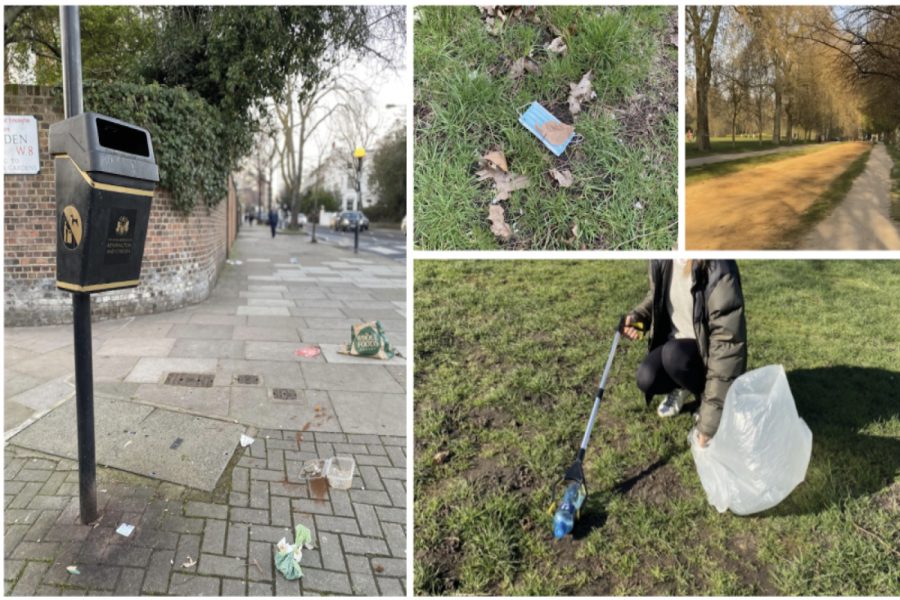Gutters pierced by plastic bottles. Hedges suffocated by wrappers. Face masks strewn across public parks. Urine bottles sickly left at curbs.
While the pandemic has underscored the importance of personal hygiene, toxic littering continues to infect our neighborhoods.
The COVID-19 pandemic has unshackled a rising tide in plastic usage. From the exceptional demand for Personal Protective Equipment to rollbacks on single-use plastic bans, the pandemic has derailed the war on waste.
Precautionary measures and PPE usage have become customary worldwide. According to the BMJ, approximately 129 billion face masks and 65 billion gloves are used monthly across the globe. A standard disposable mask, made using a variety of polymer plastics, could take up to 450 years to decompose.
The lack of concern over being fined has bred a culture where people don’t even bother to search for rubbish bins.
Alongside PPE-related waste, potentially permanent shifts towards industries that require more single-use plastics, including e-commerce and takeaway food providers, have caused an influx of littering.
With indoor dining closed, many people have resorted to take-out food as an alternative. Although restaurants in London are planned to reopen April 12, restaurants that didn’t previously offer takeout dining have discovered its profitability and may very well continue this option.
In addition, people are using — and discarding — more disposable packaging and utensils when they eat outdoors. London’s litter culture is perpetuated by these takeaway options, as food remains have become eerily unavoidable throughout public spaces.
Under Part IV of the Environmental Act of 1900, section 87 rules littering a criminal offense, carrying a maximum fine of £2,500. While entrusted with the authority to prosecute people who commit such careless offenses, local authorities are as unlikely to witness these crimes as people are to report them.
The lack of concern over being fined has bred a culture where people don’t even bother to search for rubbish bins.
Following a destructive period of Irish Republic terrorist attacks from the 70s through the 90s, the lack of bins in London derives from lingering fears of terrorism, as bins were seen as a risk for hiding bombs. When people often have to walk half a mile before finding an appropriate place to dispose of their rubbish, it is no surprise that negligent people choose to litter. In a city of almost 9 million people, rubbish and recycling bins should be placed at least every 50 meters to make it easier for people to dispose of their waste.
Even if litter is not at the forefront of your mind, I urge you to do the bare minimum and look after your own waste. Even better, think beyond yourself and consider collecting rubbish in your neighborhood and surrounding areas.
While entrusted with the authority to prosecute people who commit such careless offenses, local authorities are as unlikely to witness these crimes as people are to report them.
Over lockdown, I became so utterly fed up by the litter in my neighborhood that I ordered my own litter picker, which is now always by my front door, ready for my daily exercise. I find nothing more gratifying than looking back on a clean street and encourage others to consider taking charge of their own neighborhoods.
All you need is a recyclable bag and a pair of reusable gloves or a litter picker. If residents are seen collecting rubbish, it could make people think twice about littering. Together, we must reach a consensus that littering is socially unacceptable and do our part in restoring London’s hygiene.







Spencer Chapman • Dec 14, 2022 at 8:40 am
On my street cars stop and eat takeaways then throw it all out onto the floor. Foxes then get at it and it’s dispersed everywhere. I have the receipt with the guy’s number – can I report him?
Colin Bridgewater • Mar 30, 2021 at 8:39 pm
While having more litter bins would be appreciated, I don’t actually think that would put a dent in the problem. Instead, much of the problem is cultural. I’ve walked behind adults who walk right past bins while they unwrap a cigarette pack and drop the plastic wrap on the ground. Likewise, I’ve walked behind children who casually fling bits of their candy wrappers on the ground as they walk and eat. Add to that the government cuts over the last 10 years which means that rubbish is not collected as often and street cleaners don’t come around as often. It seems mad that people don’t care enough about the state of their own neighbourhoods to take the time to drop litter in the correct places.